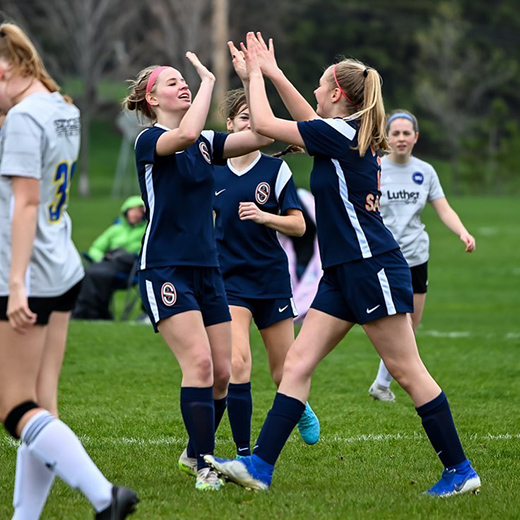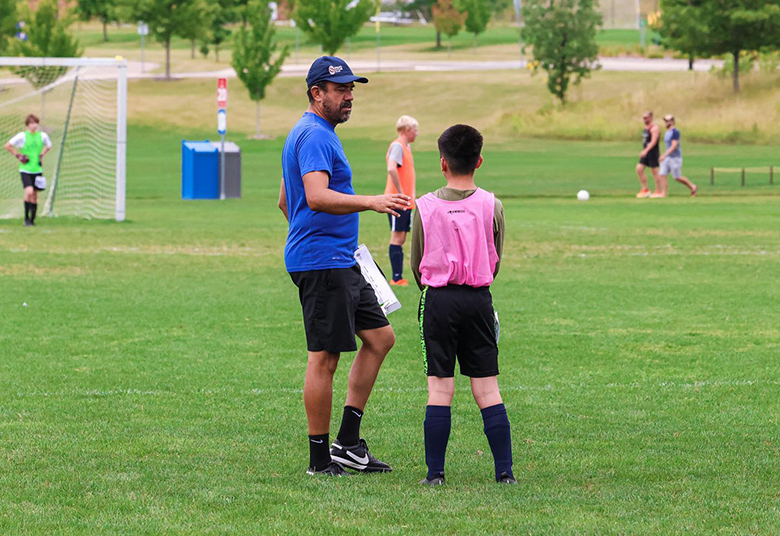The Benefits of Teamwork in Youth Soccer & How to Foster It

Teamwork is the backbone of soccer, especially in youth soccer, where the foundations of the sport and personal growth are laid. As any seasoned coach or enthusiastic soccer parent knows, the essence of the game transcends beyond individual skills; it’s about how players come together to form a cohesive unit.
In this blog post, our coaches and staff explore the multifaceted benefits of teamwork in youth soccer and provide actionable strategies for coaches and parents to foster these essential skills in young athletes.
The Benefits of Teamwork in Youth Soccer
With holistic player development as one of our top missions at Salvo SC, our focus on teamwork is paramount and developed in all stages of play, from beginner levels to Girls’ Academy and boys High Performance leagues.
Teamwork in youth soccer offers numerous physical, mental, and social benefits that contribute to the comprehensive growth of young athletes.
Physical Benefits
-
Improved Performance: Teams that work well together function more efficiently on the field. Players understand each other's strengths and weaknesses, leading to seamless coordination and improved overall performance.
-
Enhanced Skill Development: When young players collaborate, they learn from each other. This peer learning environment accelerates skill acquisition and mastery.
-
Injury Prevention: Teamwork often involves communication and spatial awareness, which can help prevent injuries. Players are more likely to avoid collisions and play more safely when they trust and coordinate with their teammates.

Mental Benefits
-
Boosted Confidence: Belonging to a supportive team can enhance a player’s self-esteem and confidence. Knowing that teammates have their back provides a sense of security and belonging.
-
Resilience & Perseverance: Experiencing both victories and defeats as a team teaches young athletes resilience. They learn to handle setbacks and celebrate successes collectively, which builds mental toughness.
-
Strategic Thinking: Teamwork encourages players to think strategically. They need to anticipate their teammates' actions and plan their movements accordingly, which sharpens their cognitive abilities and game intelligence.
Social Benefits
-
Communication Skills: Effective teamwork relies on clear communication. Young players learn to express themselves, listen to others, and provide constructive feedback, which are crucial life skills.
-
Leadership & Responsibility: Team sports offer multiple opportunities for players to take on leadership roles and responsibilities. They learn to lead by example, motivate others, and handle communal challenges.
-
Friendship & Inclusivity: Teamwork fosters a sense of camaraderie and inclusion. Young athletes form friendships that extend beyond the soccer field, contributing to a positive social environment.
How to Foster Teamwork in Youth Soccer
Fostering teamwork in youth soccer requires deliberate efforts from both coaches and parents. The more players see and experience teamwork and witness how important their role models make it, the better they can integrate it into their own personal development.
Here are practical strategies to cultivate this essential skill.
For Coaches
-
Set Clear Team Goals: Establish clear, collective goals that emphasize the importance of teamwork over individual achievements. Celebrate team successes to reinforce the value of working together. This is not only essential when building a winning team but necessary for the betterment of every player.
-
Encourage Open Communication: Create an environment where players feel comfortable voicing their thoughts and ideas. Use drills and activities that require players to communicate and make decisions together.
-
Assign Roles & Responsibilities: Rotate team roles to give every player a chance to experience different aspects of teamwork. This helps them understand and appreciate each position's contribution to the team’s success.
-
Promote Inclusivity: Ensure that every player is involved and feels valued. Avoid favoritism and encourage older or more skilled players to mentor younger or less experienced ones.
-
Use Team-Building Activities: Incorporate team-building exercises that are fun and engaging. Activities like trust falls, group problem-solving tasks, and off-field outings can strengthen team bonds.

For Parents
-
Support Team Efforts: Emphasize the importance of teamwork at home. Praise collaborative efforts and highlight how working together leads to better outcomes.
-
Model Teamwork: Children often mimic adults. Show them the value of teamwork through your actions, whether in family activities, work, or community involvement.
-
Foster a Positive Attitude: Encourage a positive attitude towards teammates and opponents. Teach your child to respect others and view every team member as a valuable part of the group.
-
Engage in Team Activities: Encourage your child to participate in activities that require teamwork outside of soccer. This could include group projects, community service, or other team sports.
-
Regular Check-Ins: Have regular conversations with your child about their team experience and soccer goals. Offer guidance on handling conflicts and emphasize the importance of empathy and cooperation.
Build Teamwork & the Team That Works for Your Athlete at Salvo SC
In the dynamic world of youth soccer, teamwork stands out as a cornerstone for both individual and collective success. It nurtures young athletes’ physical, mental, and social development, preparing them not just for the game but for life. As coaches and parents, your role in fostering these skills is invaluable.
Join Salvo SC to find the teams, coaches, and parents who make holistic growth for your soccer player possible. See our full list of girls soccer pathways and boys soccer pathways, and start growing both their love of the game and of interacting in a true community!
No matter what level your athlete wants to perform in, our soccer club has a place for them. Contact us to learn more and to sign your athlete up for our Player ID session.